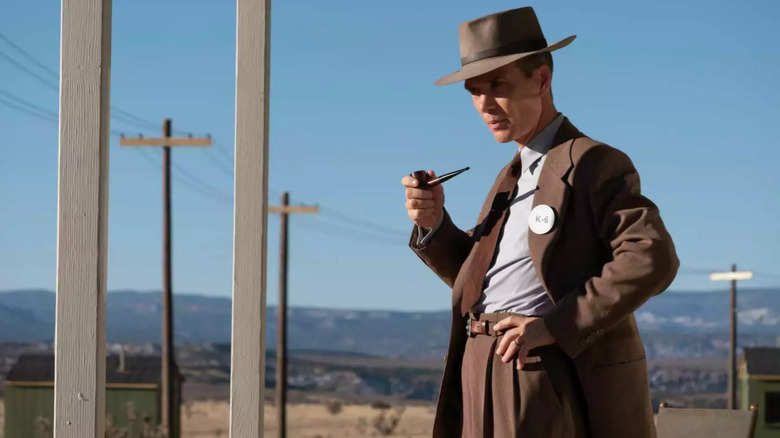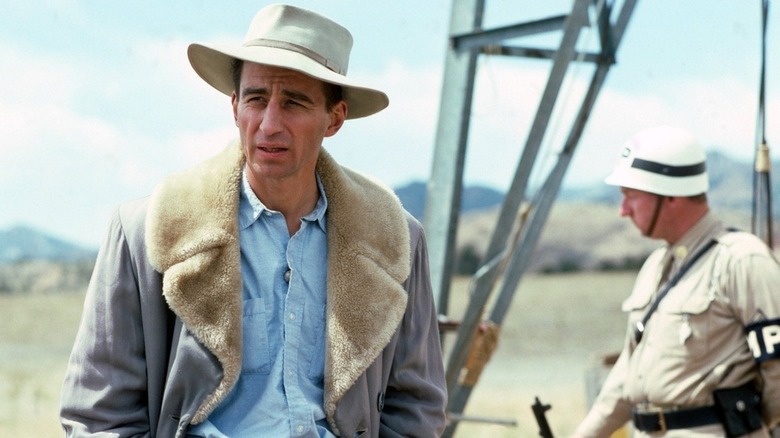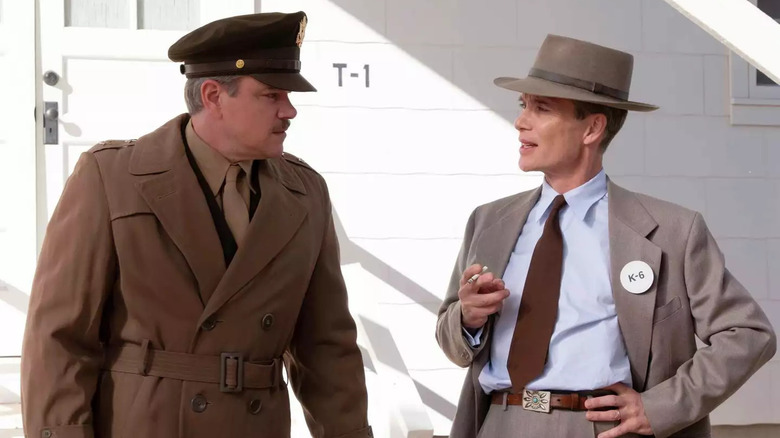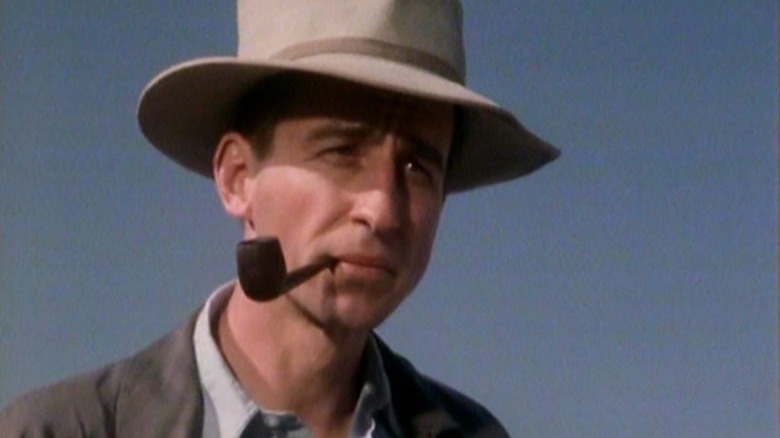Another Actor Beat Cillian Murphy To Oppenheimer About Four Decades Ago
Understandably, there has been a lot more interest in the life and times of J. Robert Oppenheimer after Christopher Nolan's biographical drama has taken cinemas by storm. Nolan's all-encompassing film, based on Kai Bird and Martin J. Sherwin's Pulitzer-winning novel "American Prometheus," gives a detailed reconstruction of what it was like to head the team that would go on to create the atomic bomb. In all likelihood, "Oppenheimer" will stand as the definitive account of the Manhattan Project and its aftermath.
Over the years, there have been multiple attempts to tell Oppenheimer's story, including the 1989 war drama "Fat Man and Little Boy" starring Paul Newman and John Cusack. The modern stage retelling, "Doctor Atomic," by the Metropolitan Opera even delves into the physicist's private life while still managing to deliver a show-stropping recreation of the first detonation of the A-bomb in Los Alamos, New Mexico.
But there's also a largely forgotten mini-series that is finding a new audience due to the increased level of fascination that's been ignited thanks to Nolan's latest epic. The seven-part BBC series "Oppenheimer" was apparently quite the primetime event when it debuted in the UK in 1980. It would go on to garner seven BAFTA nominations, winning three awards including best drama series.
Featuring a predominantly American cast, BBC's "Oppenheimer" also earned two Emmy nominations and a Golden Globe nod for its lead actor. Before Cillian Murphy donned the pipe and porkpie hat, future "Law & Order" star Sam Waterston played Oppenheimer in a heralded performance that's now being rediscovered.
Waterston's big break
Largely recognized for his long-running role on NBC's "Law & Order," a 40-year-old Waterston hadn't quite made his mark yet when he was cast as the lead in the BBC-produced series "Oppenheimer." The actor was still a few years removed from his Oscar-nominated performance as Sydney Schanberg in "The Killing Fields," which officially announced him to the Hollywood elite. Although Cillian Murphy was seemingly destined to play Oppenheimer for Christopher Nolan, casting Waterston in the role proved a little more difficult.
In a recent piece about the making of the BBC version, Variety points out that the production hired American actors that happened to be based in the U.K. as a money saving tactic. They just had to decide who to cast in the pivotal role. One option that could have been a fascinating choice was Anthony Perkins from Alfred Hitchcock's "Psycho." Perkins as the brilliant, idiosyncratic physicist seems like an inspired choice, admittedly. The role eventually went to Waterston after "Oppenheimer" line producer Ruth Caleb suggested him for the part. He was subsequently flown in from the U.S. after shooting a film in Wisconsin and was put up in the lavish, happening Chelsea neighborhood in West London.
HIs detached, stoic portrayal of Oppenheimer proved to be the lynchpin that the BBC production needed, with one scientist who worked on the Manhattan Project declaring that Waterston was "more Oppenheimer than Oppenheimer ever was." Screenwriter Peter Prince was also quoted after revisiting the series, "My abiding memory of the production is how nice Sam Waterston was to work with." The writer continued, "I re-watched a couple of episodes to refresh my memory and was reminded again how good Sam was as the actor. He was the complex Oppenheimer: charming, conflicted and driven."
The striking similarities between both versions
Although they are over 40 years removed from each other, the BBC series and Nolan's version follow a very similar narrative path, beginning with Oppenheimer's earlier collegiate life at the University of Berkeley physics department. BBC's "Oppenheimer" introduces Waterston in much the same way as Nolan does, as a curious, unfocused scientist looking for fresh ideas and philosophies, even if that meant rubbing elbows with the Communist party.
In the first two episodes, his personal life involving Jean Tatlock and his future wife, Kitty Puening, collide with the ever-pressing desire to produce an atomic bomb before the Germans do. The middle episodes focus on the growing concern about Oppenheimer's personal ties to card-carrying Leftists and the contentious relationships between the military liason General Leslie Groves and scientist Edward Teller, the father of the hydrogen bomb. Nolan's film sounds as if it deviates a little here, with more attention paid to the clash of ideas between Oppenheimer and Teller than any tension existing with Groves. In Nolan's "Oppenheimer," Matt Damon's depiction of Groves functions as more of a friend than an enemy.
Both versions of "Oppenheimer" also lead up to a brilliant recreation of the Trinity test. In episode 5 of the BBC series, archival footage documenting the actual blast was combined with material from a massive set that was built in Colorado Springs. Interestingly, the final two episodes deal with the post-war paranoia and government interference that ultimately destroyed Oppenheimer's reputation, which sounds like it's in perfect lockstep with Nolan's largely procedural final hour.
Where can you watch BBC's Oppenheimer series?
With so many similarities between the TV show and the movie, it's worth noting that Peter Goodchild, the producer who brought the idea of "Oppenheimer" to the BBC all those years ago, was never approached or contacted by Universal Studios or Nolan himself during the production of the new film. It's hard to imagine a more fleshed-out account of Oppenheimer's life, but then again, the BBC version had seven hours in total to tell the story compared to Nolan's three. Based on that and Waterston's acclaimed performance, it may be worth a watch.
Although it did originally air in the U.S. on PBS' American Playhouse, "Oppenheimer" had fallen into relative obscurity. Fortunately as of last week, the BBC has made the classic series available on its VOD platform, iPlayer. Due to "complicated" rights issues, the entire boxset of the series is, unfortunately, only available to watch if you currently reside in the UK. In any case, it's heartening to know that the critical and commercial success of Nolan's "Oppenheimer" has led to a rediscovery of the original BBC series. Apart from Waterston, the series also starred David Suchet, Kate Harper, John Carson, Christopher Munke and Jana Shelden.



